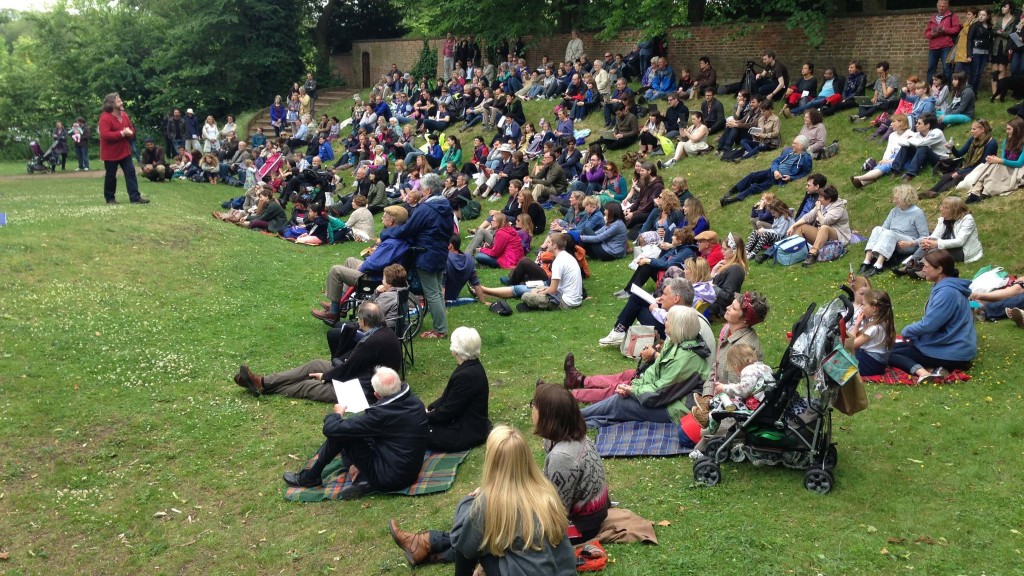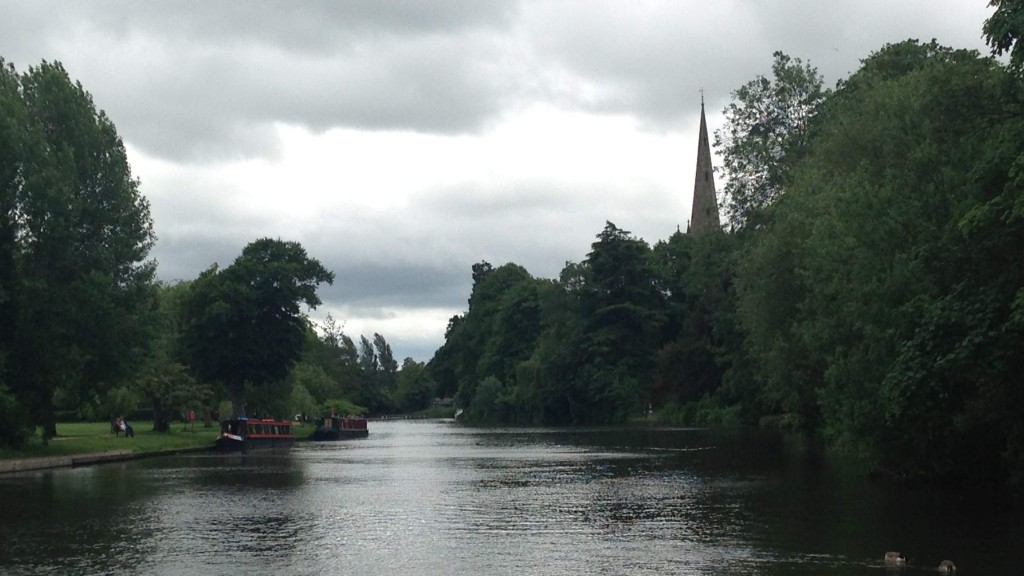Fragments of the #Dream40 [Updated]
Sometime after midnight: ‘Sweet friends, to bed.’
The rain stayed away, the moon shone bright, Act V was played for us, and the iron tongue of midnight tolled on cue.
‘So, good night unto you all.’
 5pm: Around 4pm the sun tries its best and we gather before a small outdoor stage to watch Act IV Scene 2. We are as pleased as the mechanicals to see Joe Dixon’s Bottom once again, and the five-minute excerpt from the play is a delight. After which we wander around towards the church and onto the bank of The Dell (above). We are to see a rehearsal of Act V which – in accordance with the real-time scheme of the weekend – plays tonight at 11.30pm. All is well until rain stops play (not a pun of mine, although I wish it were). The rain drops out of the sky and it is little consolation to know that there is a comparable problem at Lord’s.
5pm: Around 4pm the sun tries its best and we gather before a small outdoor stage to watch Act IV Scene 2. We are as pleased as the mechanicals to see Joe Dixon’s Bottom once again, and the five-minute excerpt from the play is a delight. After which we wander around towards the church and onto the bank of The Dell (above). We are to see a rehearsal of Act V which – in accordance with the real-time scheme of the weekend – plays tonight at 11.30pm. All is well until rain stops play (not a pun of mine, although I wish it were). The rain drops out of the sky and it is little consolation to know that there is a comparable problem at Lord’s.
 Earlier: It’s a grey old day in Stratford-upon-Avon and the rain is intermittent. Not the weather for a wedding, royal or otherwise. After last night’s wonders Midsummer Night’s Dreaming is soldiering on, but at lunchtime the bedraggled garden party of live events is all too resistible. Doubtless things will liven up later (when I’ll update), but it’s a cue to return to events online, which include Google+ #Dream40 and a ‘virtual stage’ with multiple streams of content. If I’m honest I’m finding it hard to compose a coherent response, so for the moment I am going to offer up links interspersed with fragmentary reflections.
Earlier: It’s a grey old day in Stratford-upon-Avon and the rain is intermittent. Not the weather for a wedding, royal or otherwise. After last night’s wonders Midsummer Night’s Dreaming is soldiering on, but at lunchtime the bedraggled garden party of live events is all too resistible. Doubtless things will liven up later (when I’ll update), but it’s a cue to return to events online, which include Google+ #Dream40 and a ‘virtual stage’ with multiple streams of content. If I’m honest I’m finding it hard to compose a coherent response, so for the moment I am going to offer up links interspersed with fragmentary reflections.
To kick off, here are a couple of previews of the project:
The Economist: Real-time magic
Dominic Cavendish for the Telegraph: The RSC’s digital Midsummer Night’s Dream: lunatic or inspired?
It’s also definitely worth taking a look at the developing and sympathetic response from academic Peter Kirwan at his Bardathon blog.
Tom Uglow (@tomux) from Google’s Creative Lab has provided by far the best explanation of the project:
Conventional theatre starts with a stage. An audience comes, sits in front of it, they suspend reality, enter the narrative’s reality and are entertained. But why a stage? We don’t need a stage. Modern theatre makes the audience walk, or puts them in a car, or makes them the actor; our stage is online, it is fragmented, glimpsed, experienced and amplified through sharing – the narrative exists around us and immerses us…
Today’s big news events—riots, bombings, royal weddings—all become subject to this anarchic, multi-dimensional, multi-authored storytelling. About 18 months ago we started wondering if one could apply the same treatment to a fictional narrative, like a play? Could we bring a play out of the scenic world and into the real and online worlds? Could we generate the same storytelling impetus using Google+ as a platform? … A world of peripheral, unwritten parts occurring simultaneously within and around the main play.
So I understand the impetus, but so far – away from the theatre of last night – I’m not (yet) picking up anything close to the involvement that I have this morning in, say, Edward Snowden’s flight from Hong Kong. Or even the question, tracked so compellingly by the Guardian’s OBO blog, about whether there will be any play in England vs India. Why should that be? Because ‘real life’ is more compelling than anything drama can offer us. Yes, but were the online strands of Midsummer Night’s Dreaming richer and deeper and more achieved I sense that I would be more motivated to explore them.
Another thing: is it the case that the *story* is (self-)contained within the play? And there’s no place for the narrative to develop between the acted scenes. Sure, elaborations on the characters and such like can be offered up, but there’s no opportunity for the story to be taken forward until we get back to the players. And if it’s a ‘storytelling impetus’ (Uglow’s words) that is desirable – and which will keep us hooked – isn’t this something of a flaw?
Also, where quite is the conversation about all this? Where are the contributions from beyond the team? How is the hoped-for sense of exchange taking place?
Part of my problem, I know, is that, like @mathewlowry, I find the user experience of the main ‘stage’ hard work. He has kindly crystallised why in this short video.
Yet there’s some really good stuff around the edges, including this richly informative video interview about Shakespeare’s play with RSC Artistic Director Gregory Doran.
Inevitable questions arise, including among the team last night, about how we assess all this. What are the criteria of success? What metrics are appropriate? What sense does it make to apply the conventional criteria of theatre criticism?
And here’s another – related – question via Twitter:
@Illuminations @TheRSC @tomux A lot of fun for people actually there, but is web offering just digital candyfloss?
— Duncan (@shaksper) June 23, 2013
More generally, to what extent do we think that a play by Shakespeare can become the basis of a world, the centre of a network of connections and characters and concerns that are only tangentially related to the text itself? Or is there something essential about the way in which the language unfurls that means that it resists such spinning around it? I am minded to believe the latter, although I don’t have a way of expressing quite why.
I’ll continue to muse… and perhaps even to dream, and I’ll return a little later.
Leave a Reply